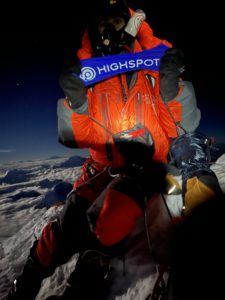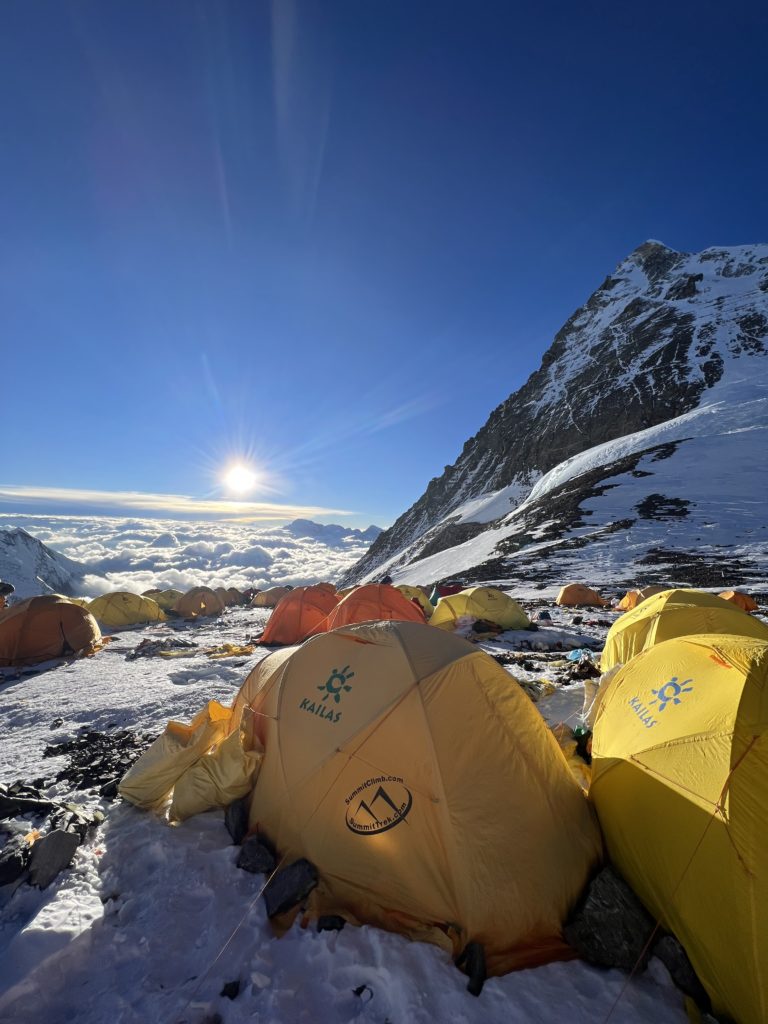On May 15, I stepped onto the summit of Mt. Everest. In the months leading up to the expedition, when I was job searching, I knew I’d need to find a company that encouraged people to make their dreams happen. When Highspot reached out for an interview, I let them know that I was planning a ten-week expedition to Nepal. Their reaction was full of support, and I soon joined the company.
Since returning from Everest, I’ve thought about lessons I learned from the mountain and how they relate to my career. I wanted to share them because these lessons aren’t just relevant to me, but to other professionals who are aiming to achieve their career goals.
Lesson #1: Shoot for your North Star
 One night I watched the film Everest. It terrified me. It also sparked a persistent thought: Could I become a new version of myself who is capable of high-altitude mountaineering? I couldn’t shake the question. And so, I scribbled down the goal that I knew would transform my life: Climb Everest.
One night I watched the film Everest. It terrified me. It also sparked a persistent thought: Could I become a new version of myself who is capable of high-altitude mountaineering? I couldn’t shake the question. And so, I scribbled down the goal that I knew would transform my life: Climb Everest.
Achieving that goal wouldn’t happen without a plan. I had to work backwards to figure out everything I needed to do to touch the roof of the world. I completed an Ironman and started climbing high-altitude peaks like Denali. When I wasn’t pushing my body’s physical limits, I was learning alpinism skills.
I think everyone should set their sights on their own North Star in their career, even if it seems unattainable. You might just end up surprising yourself with what you’re able to achieve. And if your plans or attempts fail, you have an opportunity to iterate your approach and see if you can carve a new way forward.
Lesson #2: Align with your team
Everyone arrives at Everest base camp with a vision of themselves on the summit. But once your team is together, you have to shed those individualistic visions because getting up Everest is about sometimes sacrificing your dreams to ensure your team is safe. Of course, it still takes a whole lot of self-motivation, but you have to shift your mentality from having an individual goal to a team-oriented one.
In your career, it’s the same way. You can work on projects that spark your interest, but if they aren’t contributing towards the team’s objectives, you won’t be helping your team move forward. While it’s so important to hold onto your own dreams, it’s equally important to ensure those visions align with what your team needs to succeed.
Lesson #3: Trust your gut
When you step over 26,000 feet, you enter the death zone. That means without supplementary oxygen, you can only last hours before the lack of oxygen kills you.

As we started our summit attempt in the death zone, I paused and glanced down at the sweeping valleys of glaciers and untouched snow. I felt breathless at the sight. But as I kept climbing, I realized it wasn’t the Himalayas’ beauty that was making me lose my breath – there had to be something wrong with my oxygen regulator. After inspection, my guide said that nothing was wrong and I was just tired. I wanted to believe him, but I couldn’t. I knew what my body was capable of and what my limits were. So, I headed down to Camp 4.
Upon examining my regulator, I found the issue that was causing it to malfunction. If I hadn’t trusted my gut and turned back, there could have been fatal consequences. The next night, with my regulator working properly, I set out for my second attempt and didn’t turn back until I reached the top.
When facing work challenges, I try to trust my gut because I know that our minds subconsciously connect the dots between our past experiences to the present problem. The death zone experience also taught me that the path towards your goal isn’t always straightforward. Sometimes it means taking a few steps backwards to address something that went wrong. When my work projects get derailed, I see it as an opportunity to create a more effective strategy.
Lesson #4: Never stop exploring
If you’re working towards a big goal, it’s easy to become narrow-minded. As I prepared for Everest, I’m so glad that I trained in non-mountaineering ways like running and cycling. I made friends in other athletic communities and created memories that I never would have if I had only focused on alpinism objectives.
When I was in college, I never thought I would go into consulting. But I ended up getting a consulting job offer and decided to give it a shot. I found that I loved working with clients. That work led me to Highspot where I help Highspot customers achieve their goals. I never would’ve gotten this job if I hadn’t said yes to consulting.
Today, I try to stay curious and say yes to new opportunities, especially when they’re outside of my comfort zone. I figure that the worst thing that can happen is I have a story of how I failed at something. And the best that can happen is I find a community I love and a passion that leads to incredible adventures.
If Highspot sounds like a company where you’d like to embark on your next adventure, explore our open roles.




